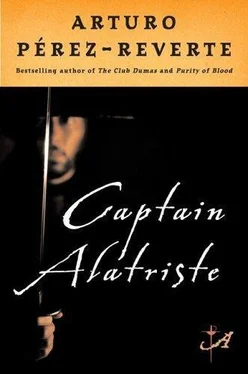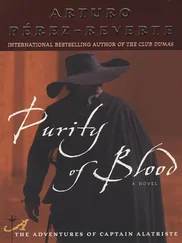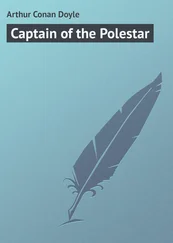Arturo Perez-Reverte - Captain Alatriste
Здесь есть возможность читать онлайн «Arturo Perez-Reverte - Captain Alatriste» весь текст электронной книги совершенно бесплатно (целиком полную версию без сокращений). В некоторых случаях можно слушать аудио, скачать через торрент в формате fb2 и присутствует краткое содержание. Жанр: Старинная литература, на английском языке. Описание произведения, (предисловие) а так же отзывы посетителей доступны на портале библиотеки ЛибКат.
- Название:Captain Alatriste
- Автор:
- Жанр:
- Год:неизвестен
- ISBN:нет данных
- Рейтинг книги:3 / 5. Голосов: 1
-
Избранное:Добавить в избранное
- Отзывы:
-
Ваша оценка:
- 60
- 1
- 2
- 3
- 4
- 5
Captain Alatriste: краткое содержание, описание и аннотация
Предлагаем к чтению аннотацию, описание, краткое содержание или предисловие (зависит от того, что написал сам автор книги «Captain Alatriste»). Если вы не нашли необходимую информацию о книге — напишите в комментариях, мы постараемся отыскать её.
Captain Alatriste — читать онлайн бесплатно полную книгу (весь текст) целиком
Ниже представлен текст книги, разбитый по страницам. Система сохранения места последней прочитанной страницы, позволяет с удобством читать онлайн бесплатно книгу «Captain Alatriste», без необходимости каждый раз заново искать на чём Вы остановились. Поставьте закладку, и сможете в любой момент перейти на страницу, на которой закончили чтение.
Интервал:
Закладка:
"But where are you taking me?"
"I cannot tell you that. In truth, I have said much more than I should." I was still in the doorway, not moving, not talking, but the high constable noticed me for a second time. "Do you want me to look after the boy?"
"No, leave him here." Alatriste did not even turn toward me, absorbed in his thoughts. "La Lebrijana will see to him."
"As you wish. Are you coming?"
"Tell me where, Martin."
Saldana shook his head, annoyed. "I have told you that I cannot."
"It would not be to the town prison, would it?"
Saldana's silence was eloquent. Then on Captain Alatriste's face I saw that grimace that sometimes took the place of a smile.
"Do you have orders to kill me?" he asked serenely.
Again Saldana shook his head. "No. I give you my word that my orders were to bring you back if you did not resist. Whether they will let you leave after I take you in is a different question. But by then you will no longer be my responsibility."
"If it weren't for the fuss it might make, they would have dispatched me right here." Alatriste pulled his finger across his throat, imitating the path of a knife. "They have sent you because they want official secrecy. Arrested, interrogated, and, they will say, set free afterward, and so on and so on. And in the meantime, who will know?"
Without hesitation, Saldana nodded his agreement. "That is what I think," he said, matter-of-factly. "I am only surprised that they did not dream up charges; whether true or false, an accusation is the easiest thing in the world to fabricate. Maybe they are afraid you will speak out in public. If truth be known, my orders were to not exchange a single word with you. And they did not want me to list your name in my ledger of prisoners. God help you!"
"Let me bring a weapon, Martin."
The constable's jaw dropped open. "A weapon? . . . Not a chance," he said after a long pause.
Moving with extreme deliberation, the captain pulled out his slaughterer's knife and showed it to the constable. "Just this one."
"You have lost your senses. Do you take me for a blockhead?"
Alatriste shook his head no. "They want to kill me," he replied simply. "That is no surprise in my trade—it will happen sooner or later. But I never like to make things easy." Again that twisted smile flowered. "I swear that I will not use it against you."
Saldana scratched his soldier's beard, which covered the long scar running from his mouth to his left ear. He had received it during the siege of Ostend, in the attacks on the redoubts of El Caballo and La Cortina, outside the walls. Among his companions on that day—and others—had been Diego Alatriste.
"Nor against any of my men," said Saldana at last.
"On my oath."
The constable still hesitated. Then he turned his back, uttering blasphemous curses under his breath, as the captain slid the knife down the leg of a boot.
"Damn your eyes, Diego," said Saldana, finally. "Let's get our asses out of here."
They left with no further conversation. The captain chose not to wear his cloak, to suggest he was defenseless, and Martin Saldana agreed. He also allowed his old friend to wear a buff coat over his doublet. "It will guard against the cold," he said, hiding a smile. As for me, I neither stayed at home nor went to Caridad la Lebrijana's. The minute they started down the stairs, without thinking twice I grabbed the pistols from the table and the sword hanging on the wall, and bundled them all up in the captain's cloak, then tucked them under my arm and ran after them.
There was very little day left in the sky of Madrid, barely a glow outlining rooftops and bell towers toward the Manzanares River and the Royal Palace. And so, at dusk, with shadows slowly creeping over the streets, I followed behind the closed carriage pulled by four mules, in which Martin Saldana and his catchpoles were transporting the captain. They drove past the Jesuit school, down Calle Toledo, and into La Cebada plaza—undoubtedly to avoid busy streets—then turned toward the small hill of the Rastro fountain before again bearing right. They were almost at the outskirts of the city, very near the Toledo road, the slaughterhouse, and a site that had been a Moorish cemetery long before, but now, because of its bad reputation, was called the Portillo de las Animas. Given its macabre history and the gloomy hour, this Gate of Lost Souls was not the most comforting place in the world to be.
Night had definitely fallen when the carriage stopped before a deserted-looking house with two small windows and a large carriage courtyard that seemed better suited for horses than for anything else. I guessed that in the past it had been an inn for cattle traders. I stood at the corner, panting, hidden by a large carriage guard, with my bundle beneath my arm. I saw Alatriste, resigned and calm, get out of the carriage, surrounded by Saldana and his bailiffs. They all went inside, and after a while I watched them come out without the captain, climb into the carriage, and leave. That disturbed me, for I did not know who else might be inside the house. I eliminated the idea of going any closer because I would run the certain risk of being caught.
And so, twitching with anxiety, but patient, "as every man-of-arms must be"—as I had heard Alatriste himself say—I squeezed back against the wall to blend into the darkness, and prepared to wait. I confess that I was cold and afraid. But I was the son of Lope Balboa, a soldier of the king who had died in Flanders. And I could not abandon my father's friend.
VIII. THE GATE OF LOST SOULS
It looked like a tribunal, and Diego Alatriste did not have the least doubt that it was. One of the masked men was absent, the corpulent one who had insisted that there be little blood. His companion, however—the man with the round head and coarse, thin hair—was there, wearing the same mask and sitting behind a long table on which there were a lighted candelabrum and writing materials: goose quills, paper, and inkwell. His hostile aspect and his attitude would have been the most disturbing thing in the world had it not been for someone more disturbing seated beside him. That person wore no mask, and his hands were bony serpents slithering from the sleeves of his habit: Fray Emilio Bocanegra.
There were no other chairs, so Captain Alatriste stood as he was questioned. It was, in fact, a standard interrogation, a task with which the Dominican priest was well acquainted. It was obvious that he was furious, worlds away from anything remotely related to Christian charity. The wavering light from the candelabrum deepened his sunken, badly shaved cheeks, and his eyes glittered with hatred as they bore into Alatriste. His entire person, from the way in which he asked questions to the least perceptible of his movements, conveyed distilled menace; the captain glanced around, looking for the rack on which, very soon, he would be tortured. He was surprised that Saldana had left with his men, and that there were no guards in sight; it appeared that only the masked man, the priest, and he were present. He sensed something strange, a discordant note in all this. Something was not as it should be. Or seemed to be.
The questioning by the Inquisitor and his companion, who from time to time bent over the table to dip a feather pen into the inkwell and jot down some observation, lasted half an hour. In that time the captain had woven together a fabric of places and circumstances, including why he found himself there, alive, able to move his tongue and articulate sounds, instead of sprawled on some dumping ground with his throat cut like a dog.
What most concerned his interrogators was the question of how much he had told, and to whom. Many questions were directed toward the role of Guadalmedina on the night of the adventure of the Englishmen, and especially toward establishing how the count had become implicated, and how much he knew about the matter. The inquisitors also showed special interest in learning whether other parties had been informed, and the names of any who might have partial knowledge of the affair.
Читать дальшеИнтервал:
Закладка:
Похожие книги на «Captain Alatriste»
Представляем Вашему вниманию похожие книги на «Captain Alatriste» списком для выбора. Мы отобрали схожую по названию и смыслу литературу в надежде предоставить читателям больше вариантов отыскать новые, интересные, ещё непрочитанные произведения.
Обсуждение, отзывы о книге «Captain Alatriste» и просто собственные мнения читателей. Оставьте ваши комментарии, напишите, что Вы думаете о произведении, его смысле или главных героях. Укажите что конкретно понравилось, а что нет, и почему Вы так считаете.










